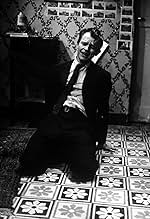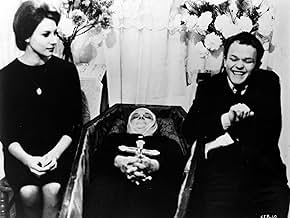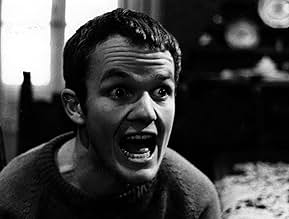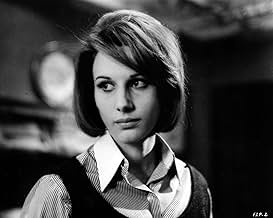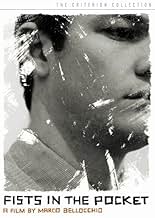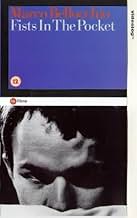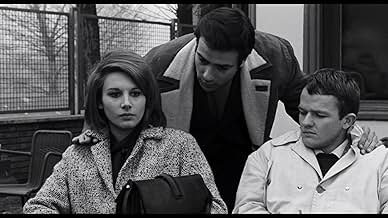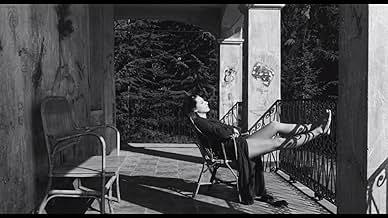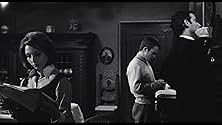IMDb RATING
7.6/10
5.3K
YOUR RATING
A young man takes drastic measures to rid his dysfunctional family of its various afflictions.A young man takes drastic measures to rid his dysfunctional family of its various afflictions.A young man takes drastic measures to rid his dysfunctional family of its various afflictions.
- Awards
- 4 wins & 5 nominations total
Pier Luigi Troglio
- Leone
- (as Pierluigi Troglio)
Jeannie McNeil
- Lucia
- (as Jenny Mac Neil)
- Director
- Writer
- All cast & crew
- Production, box office & more at IMDbPro
Featured reviews
Marco Bellocchio directs his first full-length film, and it's already a masterpiece, a milestone in the history of Italian cinema.This movie is all about contemporary uneasiness and family crisis in today's society (only, some two decades in advance). Every time I hear of family massacres on the news, I've got to think about problematic, disturbed Lou Castel deciding to get rid of his mother and younger brother for the benefit of the eldest, embodying not only a stage of criminality, but above all a wrong philosophy, a twisted point of view about life, a failed maturity. Ennio Morricone' score is just perfect, fully successful in his aim to highlight the dramatic potential of the story. Lou Castel has never acted like this, his grimacing and his usage of the dead moments are unforgettable. The frames of the mother's death are like an howl, they "send shivers down your spine". A must-see.
Pimpin places a call to his favorite writer Michel Houellebecq.
Pimpin: Hello.
Michel: Hello. Who is this?
Pimpin: Michel, its me Pimpin.
Michel: What do you want?
Pimpin: Sorry to disturb. I wanted to discuss a film that I watched. I wanted to hear your thoughts on it. Its this Italian film - Fists in the Pocket by Marco Belloccio. Came out in the 60s.
Michel: OK.
Pimpin: What do you think about it?
Michel: It did have a couple of nice pieces of ass. Paola Pitagora was unforgettable.
Pimpin: Hahahha. I agree. What did you think about the film?
Michel: Well, it was one of those films where the protagonist rebelled against his family and Catholic values. You know what I think about all that stuff, Pimpin. Nothing good came out of it. Sure, a lot of people escaped their families. And then they went and lived alone. Did drugs. Drank a lot. Individuality and personal freedom. Look at where all that got Europe now.
Pimpin: I thought the film was quite slow.
Michel: Its a piece of crap. But then, it was made in the 60s.
Pimpin: I did some research on it. The film apparently predicted the student and youth riots of the late 60s in Italy.
Michel: Hahahah. You really bought into all that crap?
Pimpin: I know its a bit like how Indian social commentators use crappy films like Deewar to explain the 70s and 80s.
Michel: Exactly. Its completely phony Pimpin.
Pimpin: I'm still confused. I don't know what to think about the film. I mean, the film is quite depressing.
Michel: Well, tell me something about the cinematography, pacing and background score. That would help us interpret it better.
Pimpin: It was a very stark film. Morricone's score was very bleak. The score is played during all the murder and post-murder scenes. It is one of Morricone's bleakest scores. I liked the way some of the scenes were framed. Like at the party where the rebellious protagonist is sitting alone and there are a lot of people dancing. He does not even drink. He has no bad habits. But he wants to kill off his family. The pacing was slow.
Michel: Did you identify with the film?
Pimpin: Sort of. But like I said it was too slow. The actors were great. The director was quite successful in capturing the claustrophobic environment in which the family lives.
Michel: Did you get married recently?
Pimpin: Yes.
Michel: So you are not to be trusted.
Pimpin: Why?
Michel: You would have liked this film a lot more during your wild bachelor days.
Pimpin: Thats probably true, Michel.
Michel: It is.
Pimpin: I did think that it was a very personal film. I mean, the director is very talented. He did portray the ills of the bourgeois life and the life lived on pure instinct quite well. I don't think he was rooting for either.
Michel: Did it work as a murder mystery?
Pimpin: No. I think it works best as the zeitgeist of that time in Italy. But it was quite boring for me.
Michel: OK. Is there anything else that you want to discuss?
Pimpin: The actors were great. I mean, most of them were better than the ones in the worst Indian movies. But I would not watch another movie because anyone of them were in it.
Michel: OK.
Pimpin: Read about he Paris attacks. Quite scary.
Michel: (Silence)
Pimpin: Hello?
Michel: Pimpin, you weren't too impressed by this film. In fact, you were bored to death. You only called me because it had an 8 rating on IMDb.
Pimpin: You are right, Michel.
Michel: Take care, Pimpin.
Pimpin: Bye, Michel.
Michel: Bye
Pimpin: Hello.
Michel: Hello. Who is this?
Pimpin: Michel, its me Pimpin.
Michel: What do you want?
Pimpin: Sorry to disturb. I wanted to discuss a film that I watched. I wanted to hear your thoughts on it. Its this Italian film - Fists in the Pocket by Marco Belloccio. Came out in the 60s.
Michel: OK.
Pimpin: What do you think about it?
Michel: It did have a couple of nice pieces of ass. Paola Pitagora was unforgettable.
Pimpin: Hahahha. I agree. What did you think about the film?
Michel: Well, it was one of those films where the protagonist rebelled against his family and Catholic values. You know what I think about all that stuff, Pimpin. Nothing good came out of it. Sure, a lot of people escaped their families. And then they went and lived alone. Did drugs. Drank a lot. Individuality and personal freedom. Look at where all that got Europe now.
Pimpin: I thought the film was quite slow.
Michel: Its a piece of crap. But then, it was made in the 60s.
Pimpin: I did some research on it. The film apparently predicted the student and youth riots of the late 60s in Italy.
Michel: Hahahah. You really bought into all that crap?
Pimpin: I know its a bit like how Indian social commentators use crappy films like Deewar to explain the 70s and 80s.
Michel: Exactly. Its completely phony Pimpin.
Pimpin: I'm still confused. I don't know what to think about the film. I mean, the film is quite depressing.
Michel: Well, tell me something about the cinematography, pacing and background score. That would help us interpret it better.
Pimpin: It was a very stark film. Morricone's score was very bleak. The score is played during all the murder and post-murder scenes. It is one of Morricone's bleakest scores. I liked the way some of the scenes were framed. Like at the party where the rebellious protagonist is sitting alone and there are a lot of people dancing. He does not even drink. He has no bad habits. But he wants to kill off his family. The pacing was slow.
Michel: Did you identify with the film?
Pimpin: Sort of. But like I said it was too slow. The actors were great. The director was quite successful in capturing the claustrophobic environment in which the family lives.
Michel: Did you get married recently?
Pimpin: Yes.
Michel: So you are not to be trusted.
Pimpin: Why?
Michel: You would have liked this film a lot more during your wild bachelor days.
Pimpin: Thats probably true, Michel.
Michel: It is.
Pimpin: I did think that it was a very personal film. I mean, the director is very talented. He did portray the ills of the bourgeois life and the life lived on pure instinct quite well. I don't think he was rooting for either.
Michel: Did it work as a murder mystery?
Pimpin: No. I think it works best as the zeitgeist of that time in Italy. But it was quite boring for me.
Michel: OK. Is there anything else that you want to discuss?
Pimpin: The actors were great. I mean, most of them were better than the ones in the worst Indian movies. But I would not watch another movie because anyone of them were in it.
Michel: OK.
Pimpin: Read about he Paris attacks. Quite scary.
Michel: (Silence)
Pimpin: Hello?
Michel: Pimpin, you weren't too impressed by this film. In fact, you were bored to death. You only called me because it had an 8 rating on IMDb.
Pimpin: You are right, Michel.
Michel: Take care, Pimpin.
Pimpin: Bye, Michel.
Michel: Bye
Beautifully filmed, with nice cinematography and camera movements, mostly in indoor footage, the novienis also interesting in its unique subject. While the development of the story is perhaps too slow in the beginning (although with some grat scenes), the film becomes incrisingly disturbing. Hatred for family, order and tradition is portrayed as aiming a final solution - if you understand what I mean... All members of the family (in different ways, all of them are overly self-centred) are well developped in their dysfunctional relationship, phisically represented in blindness, intellectual disability and epilepsy. Curiously, a "handicapped" himself is moved by a creepy cleansing impulse. Even his closest person, his beautiful sister, with whom he has a complicity relatiinship, is not out of danger.
The Sixties was a time of breaking rules and exploring social themes and political ideas that weren't allowed to be expressed in the repressive Fifties. It was a Golden Era of Italian cinema, producing Antonioni's, Visconti's and Fellini's best films, along with so many gems like Olmi's "Il Posto", Germi's "Divorce: Italian Style" and Monicelli's "The Organiser." "Fists in the Pocket" stands out for its dark subject matter, which examines the mind of a sociopath.
While this was not new ground—Clouzot's "Diabolique", Clement's "Purple Noon", Powell's "Peeping Tom" and Hitchcock's more lurid "Psycho" allowed us into the head of a killer—"Fists in the Pocket" portrays a much more nuanced character. What those films don't spend a lot of time on is the motivation behind their characters' actions, outside of their own amoral nature or perhaps some hinted trauma. In this film, while we certainly don't sympathise with the characters' actions, we clearly understand their motivations.
The protagonist of the film is Sandro, but I'd argue that the main character is the family, since it's the family dynamic that drives all action in the film. Sandro and two of his three siblings have varying degrees of epilepsy, and all three grown children live with and care for their blind mother. There's a definite sense of claustrophobia and dread in this family, who all seem trapped by their own love for each other. Their desire to break free of their mother's control and the burden of caring for each other leads to plans being hatched and tragic consequences.
It's quite an oddball story, almost Lynchian, but what makes the characters so utterly believable is the unpredictability of their behaviour, along with some excellent acting, particularly by Lou Castel, who allows us to see into his mind without saying a word. Add to that a soundtrack by Ennio Morricone and absolutely sublime photography—it's one of those rare films where you can frame almost every shot—and you've got one of the standout films from a standout period of filmmaking.
While this was not new ground—Clouzot's "Diabolique", Clement's "Purple Noon", Powell's "Peeping Tom" and Hitchcock's more lurid "Psycho" allowed us into the head of a killer—"Fists in the Pocket" portrays a much more nuanced character. What those films don't spend a lot of time on is the motivation behind their characters' actions, outside of their own amoral nature or perhaps some hinted trauma. In this film, while we certainly don't sympathise with the characters' actions, we clearly understand their motivations.
The protagonist of the film is Sandro, but I'd argue that the main character is the family, since it's the family dynamic that drives all action in the film. Sandro and two of his three siblings have varying degrees of epilepsy, and all three grown children live with and care for their blind mother. There's a definite sense of claustrophobia and dread in this family, who all seem trapped by their own love for each other. Their desire to break free of their mother's control and the burden of caring for each other leads to plans being hatched and tragic consequences.
It's quite an oddball story, almost Lynchian, but what makes the characters so utterly believable is the unpredictability of their behaviour, along with some excellent acting, particularly by Lou Castel, who allows us to see into his mind without saying a word. Add to that a soundtrack by Ennio Morricone and absolutely sublime photography—it's one of those rare films where you can frame almost every shot—and you've got one of the standout films from a standout period of filmmaking.
The first time I saw Fists in the Pocket, I was 7 or 8 years old and I thought the film was a horror movie because of its gruesome subject matter. It had freaked me a lot then. Today, after viewing it for the first time in its entirety, and though I don't think the film can be considered to be an all and out horror flick, I still think there's enough gruesome and eerie qualities to this drama to call it an authentic neo-horror film. A horror film with intelligence. Unlike Hitchcock (no, I'm not saying his films aren't intelligent) or the plethora of other less subtle horror films, where the horror or terror is mostly obvious and played for thrills to manipulate an audience, in Fists the disturbing aspects aren't played out for thrills. They're there to show the sad situation in which the characters exist. Because of this, the film has a true morbid atmosphere, quasi-Gothic in nature, that permeates it from beginning to end. The characters inability to see the horrifying things they do or think (for most part of the narrative) makes this film absolutely unique in film history. It's a vivid "intimate" portrait of a dysfunctional family that's almost a cerebral horror film.
Simply put, it's brilliant!
The actors are all excellent but Lou Castel's performance as the frustrated, crazed, death obsessed brother is mesmerizing. You can't take your eyes off him. And even though it was made in 1965, the film feels contemporary, mainly because of its refusal to amplify and exploit it shocking aspects or the characters' foibles to heights of schlock or melodrama. Plus, the fluid direction gives this morbid drama (which could have easily been heavy and static) a deceptively "normal" quality which works perfectly and adds even more to all of the characters' sad state of mind. The film is equally claustrophobic and expansive; claustrophobic with the (very) tight interiors and the family drama that (like one of the characters of the film wants to do) makes you want to break free and escape at all cost; and expansive because of the Italian countryside that surrounds these doomed characters. The scenery, natural and man-made, is a character of its own, seemingly symbolizing the characters precipitous existence but also overwhelmingly vast, stark and crushing, dwarfing the already tightly-knit family down to minuscule size, which then heightens their already claustrophobic existence that much more. Ennio Morricone's score is characteristically moody & chilling and complements the film perfectly.
Fists in the Pocket is a very earthy, grounded, morbid & blunt portrait of a doomed family! A must-see for those who love "pure" cinema.
Simply put, it's brilliant!
The actors are all excellent but Lou Castel's performance as the frustrated, crazed, death obsessed brother is mesmerizing. You can't take your eyes off him. And even though it was made in 1965, the film feels contemporary, mainly because of its refusal to amplify and exploit it shocking aspects or the characters' foibles to heights of schlock or melodrama. Plus, the fluid direction gives this morbid drama (which could have easily been heavy and static) a deceptively "normal" quality which works perfectly and adds even more to all of the characters' sad state of mind. The film is equally claustrophobic and expansive; claustrophobic with the (very) tight interiors and the family drama that (like one of the characters of the film wants to do) makes you want to break free and escape at all cost; and expansive because of the Italian countryside that surrounds these doomed characters. The scenery, natural and man-made, is a character of its own, seemingly symbolizing the characters precipitous existence but also overwhelmingly vast, stark and crushing, dwarfing the already tightly-knit family down to minuscule size, which then heightens their already claustrophobic existence that much more. Ennio Morricone's score is characteristically moody & chilling and complements the film perfectly.
Fists in the Pocket is a very earthy, grounded, morbid & blunt portrait of a doomed family! A must-see for those who love "pure" cinema.
Storyline
Did you know
- TriviaThe house, the film's main location, is the house director Marco Bellocchio spent his childhood days in.
- GoofsWhen the whole family is having dinner, Augusto is seated at one corner of the table and the mother is sitting on a side at the other corner. The cat is shown to be eating meat off the mother's plate in one scene, but in the next scene Augusto is shown picking up the cat as if was right next to him on the table. Once he removes the cat, the next camera angle again shows Augusto and the mother at opposite ends.
- Quotes
Alessandro: I'm a volcano of ideas.
- ConnectionsEdited into Sorelle (2006)
- SoundtracksExcerpt from La Traviata
composed by Giuseppe Verdi (uncredited)
lyrics by Francesco Maria Piave (uncredited)
- How long is Fists in the Pocket?Powered by Alexa
Details
- Release date
- Country of origin
- Official sites
- Languages
- Also known as
- Fist in His Pocket
- Filming locations
- Production company
- See more company credits at IMDbPro
- Runtime1 hour 50 minutes
- Color
- Sound mix
- Aspect ratio
- 1.85 : 1
Contribute to this page
Suggest an edit or add missing content


![Watch Trailer [OV]](https://m.media-amazon.com/images/M/MV5BNjc5ZDU5NDgtZTliZC00MjQwLThjNjItMDhjZmFmZGMxZTI2XkEyXkFqcGdeQXRyYW5zY29kZS13b3JrZmxvdw@@._V1_QL75_UY281_CR6,0,500,281_.jpg)
